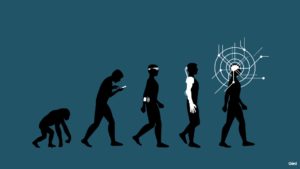
A number of scholars of post-humanity (such as Hayles and Wolfe) have argued that transhumanism is an unduly optimistic extension of humanism. I can’t agree – not only is it not optimistic, it is not a humanism. Transhumanism is filled with the anxiety of extinction. It also is enthused enough about non-human flourishing that it marks a departure from humanism (besides: is anything more optimistic than humanism in its enlightenment mode?). Transhumanism’s posthumanist stance is the continuation of enlightenment technoscience in so far as it centralizes human technology, even if it projects the technoscientific breakdown of humanity. However, insofar as its ideas and projected technologies propose an almost panpsychic collapse of mind and matter, it pushes us beyond reductive materialist, secular and humanist arrangements, and points to some interesting new openings.
One way to go about thinking through all this is to consider, as Bialecki and Lowrie have suggested, the figure of anthropos. The human is, as Foucault pointed out, an image built through a series of disciplines (biology, economics, linguistics) that came together in the space of non-transcendental knowledge to capture human activity (life, labor, language). The figure under which that image has been organized is anthropos, combining modern science and humanism in an often fraught relationship.
Continue reading “Transhumanism, Tragic Humanism, and The View From Nowhere”

